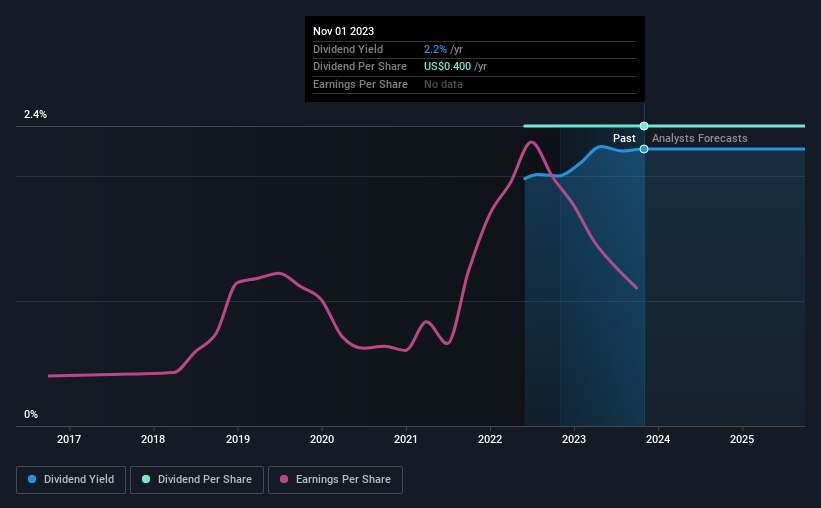Should You Buy Hanover Bancorp, Inc. (NASDAQ:HNVR) For Its Upcoming Dividend?
Some investors rely on dividends for growing their wealth, and if you're one of those dividend sleuths, you might be intrigued to know that Hanover Bancorp, Inc. (NASDAQ:HNVR) is about to go ex-dividend in just four days. The ex-dividend date occurs one day before the record date which is the day on which shareholders need to be on the company's books in order to receive a dividend. The ex-dividend date is important because any transaction on a stock needs to have been settled before the record date in order to be eligible for a dividend. Meaning, you will need to purchase Hanover Bancorp's shares before the 7th of November to receive the dividend, which will be paid on the 15th of November.
The company's next dividend payment will be US$0.10 per share, and in the last 12 months, the company paid a total of US$0.40 per share. Calculating the last year's worth of payments shows that Hanover Bancorp has a trailing yield of 2.2% on the current share price of $18.05. Dividends are an important source of income to many shareholders, but the health of the business is crucial to maintaining those dividends. That's why we should always check whether the dividend payments appear sustainable, and if the company is growing.
See our latest analysis for Hanover Bancorp
If a company pays out more in dividends than it earned, then the dividend might become unsustainable - hardly an ideal situation. Hanover Bancorp paid out just 17% of its profit last year, which we think is conservatively low and leaves plenty of margin for unexpected circumstances.
Companies that pay out less in dividends than they earn in profits generally have more sustainable dividends. The lower the payout ratio, the more wiggle room the business has before it could be forced to cut the dividend.
Click here to see how much of its profit Hanover Bancorp paid out over the last 12 months.
Have Earnings And Dividends Been Growing?
Businesses with strong growth prospects usually make the best dividend payers, because it's easier to grow dividends when earnings per share are improving. If earnings fall far enough, the company could be forced to cut its dividend. With that in mind, we're encouraged by the steady growth at Hanover Bancorp, with earnings per share up 8.3% on average over the last five years.
Given that Hanover Bancorp has only been paying a dividend for a year, there's not much of a past history to draw insight from.
The Bottom Line
Is Hanover Bancorp worth buying for its dividend? Hanover Bancorp has seen its earnings per share grow slowly in recent years, and the company reinvests more than half of its profits in the business, which generally bodes well for its future prospects. Overall, Hanover Bancorp looks like a promising dividend stock in this analysis, and we think it would be worth investigating further.
While it's tempting to invest in Hanover Bancorp for the dividends alone, you should always be mindful of the risks involved. To help with this, we've discovered 2 warning signs for Hanover Bancorp (1 can't be ignored!) that you ought to be aware of before buying the shares.
A common investing mistake is buying the first interesting stock you see. Here you can find a full list of high-yield dividend stocks.
Have feedback on this article? Concerned about the content? Get in touch with us directly. Alternatively, email editorial-team (at) simplywallst.com.
This article by Simply Wall St is general in nature. We provide commentary based on historical data and analyst forecasts only using an unbiased methodology and our articles are not intended to be financial advice. It does not constitute a recommendation to buy or sell any stock, and does not take account of your objectives, or your financial situation. We aim to bring you long-term focused analysis driven by fundamental data. Note that our analysis may not factor in the latest price-sensitive company announcements or qualitative material. Simply Wall St has no position in any stocks mentioned.

